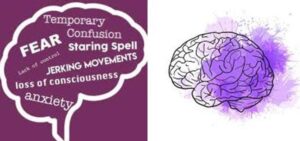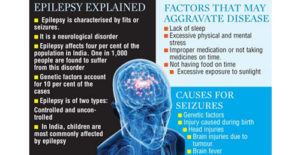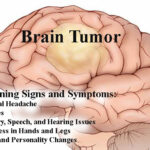Epilepsy can impact the quality of life and ignoring it can be dangerous. Epilepsy is not usually a complex condition to treat, but depending on the type of seizure, the symptoms vary from person to person.


Epilepsy, a neurological problem that affects people of all age group is the 4th largest chronic disorder globally. Characterized by unpredictable seizures, this can affect the day today life of a person leading to other health problems. With various kind of seizure types, epilepsy varies from person to person. The stigma associated with epilepsy and the lack of awareness among general public has mostly delayed the diagnosis and treatment to manage the condition.
According to a report by WHO, over 50 million people worldwide have epilepsy, making it one of the most common neurological diseases globally. Nearly 80% of people with epilepsy live in low- and middle-income countries and it is estimated that 70% of people living with epilepsy could live seizure- free if diagnosed early and treated.
Educating people about the symptoms is important:
Epilepsy is not contagious. Although fits and seizures are direct symptoms of this, it is difficult to diagnose people suffering from complex partial seizures. The social stigma is another factor which delays the treatment for the problem. Hence creating awareness and educating people about the symptoms of epilepsy is important.
The mental complexities due to epilepsy, seizures, continuous medications, sexual orientation, anxiety can force an epileptic patient to lose self-esteem, enthusiasm and fall into depression thus impacting the quality of life. Also, the misconception associated with the condition can make people disengage themselves from the family and social life leading to severe health issues.
Causes for Epilepsy:
This problem can start at any age, but mostly begins during childhood. There is no specific reason for developing this condition, however, in some cases which occurs later in the life are associated with damage to the brain. Following are the few conditions which can lead to epilepsy.
- Severe head injury
- Cerebrovascular disease
- Brain tumors
- Hereditary


Signs and symptoms
The main symptoms of epilepsy is repeated seizures. It can occur when you are awake or asleep. Below are the other signs and symptoms:
- Uncontrolled jerking movements of the arms and legs
- Confusion
- Loss of awareness and consciousness
- Blank stare
- Loss of bladder or bowel control
- Frothing from the mouth
Depending on the type of seizure, the symptoms vary from person to person. Some of the triggering factors of an epileptic seizure are:
- Fever or illness
- Lack of sleep
- Stress
- Flashing and bright lights
- Drugs, medicine, alcohol and caffeine
- Low blood sugar
As identifying the triggers for seizures is not easy and also the fact that multiple factors can trigger seizures, doctors recommend maintaining a ‘seizure journal’.
How can untreated epilepsy affect life?
In most cases, individuals with epilepsy who do not have any other neurological disorders, continue to be normal except for the brief time of seizure. After experiencing seizure which lasts for a few minutes, the individual comes may back to normalcy and avoid visiting the doctor. As it is hard to predict the occurrence of these seizures, it may affect a person’s normal life.
What if the next time you get seizures when you are in the middle of an important meeting at the office or while partying with your friends or driving on a highway or while crossing a busy traffic junction? Ignoring epilepsy can be dangerous. Sadly, some people even today look at epilepsy as a contagious disease and a demonic possession and resort to discrimination.
Prevention
Epilepsy is not usually a complex condition to treat. Seizures can be controlled and with the appropriate use of anti-seizure medications and treatment. It is estimated that nearly one-fourth of epilepsy cases are preventable. Follow these tips.
- Have uninterrupted sleep of 6-8 hours every day.
- Set a sleep schedule and stick to it.
- Beat the stress with relaxation techniques and meditation.
- Stay away from bright flashy lights, video games and other visual stimuli.
- Be active and follow a healthy diet plan
New cases of epilepsy caused by birth injury can be reduced if adequate perinatal care is taken. If you suspect you had a seizure, do not neglect it, consult your doctor at the earliest.


Dr. Vishakhadatta Mathur Kumaraswamy
Consultant- Neurology
Columbia Asia Hospital Sarjapur Road











